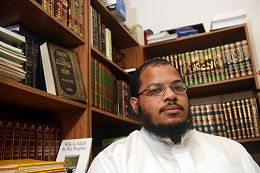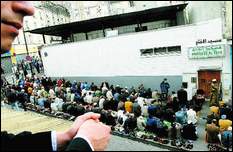
American imam leading diverse Muslim community
By JIM HAUG
Staff Writer
DAYTONA BEACH -- For much of its 30-year history, the Muslim community here has relied on foreign-born religious leaders.
This summer, Muslims have begun listening to the sermons of a 29-year-old who likes to play video games and root for the Washington Redskins.
With an American birthplace, Ron Smith is not subjected to the same worries of Muslim immigrants in this anxious age after 9-11. "If they deport me, they'll have to send me back to New Jersey," joked Smith about his home state.
Criteria for imams -- Islamic religious leaders -- are not formalized, but the Islamic Center of Daytona Beach has usually chosen imams on the basis of their religious knowledge and ability to speak Arabic and English.
The main Friday sermon is given in both languages.
Trying to hire an imam suitable to both Arabic- and English-speaking audiences has always been a tricky balance, said Idris Muhammad, a trustee of the local mosque.
The English of foreign-born imams has not always been as good as their Arabic or else they have spoken in unfamiliar Arabic dialects, Muhammad said.
As a consequence, "part of the community has felt left out at times," he said. "It's like a Northerner going to a Southern barbecue."
The local Muslim community is extremely diverse with members coming from the Middle East, the Balkan states and the South Pacific. The mosque on Keech Street attracts about 300 people on Fridays, Muslims' main day of worship.
But on major holidays, the mosque will get as many as 600 to 800 people. "The food is always exotic," Muhammad said.
Born to a Puerto Rican mother, a Catholic, and a Baptist African-American father, Smith is well suited as a community bridge builder.
As a lighter skin black, "I could easily pass for a Moroccan," Smith said.
Smith is also good with languages, speaking both Spanish and Arabic, along with English. When he meets an Arab, he said, "I prefer to speak Arabic."
He fit so well in Saudi Arabia that he said he never felt any of the usual hostility directed toward Americans. After six years of study, Smith graduated this year from the Islamic University of Medina in Saudi Arabia with degrees in Arabic and Islamic scholarship.
"That's definitely prestigious," said Phillip Lucas, a professor of religious studies at Stetson University. "It's fairly unusual to have someone from the U.S. with a degree from Saudi Arabia."
But Smith said, "It's all who you know."
After getting out of the Army, he was working as a "quality assurance manager" for a call center in Daytona Beach in 1999.
He met some Muslims at the Islamic Center with contacts in Saudi Arabia. Winning a full scholarship to university there was not part of a master plan by the mosque to get a new imam, Smith said.
Instead, he said it was part of his dedication to a religion that turned his life around.
Smith became a Muslim at age 14 after a teenage cousin was stabbed to death. "I thought if I don't get my act together soon, I could end up the same way," Smith said. Religion wasn't a regular part of his life before.
Muslim street vendors in Atlantic City and a world religion class in high school first exposed him to Islam. One day, he decided to walk into a mosque to find about Islam for himself.
"I actually began to see changes in my life," Smith said. "I became serious about school, became more respectful to my grandmother."
Smith has four children, ages 2-8, with his wife, Conseulo. The family endured six tough years in Saudi Arabia. The cultural differences "smacked you in the face," he said.
His wife was not allowed to drive and had to cover herself completely in public. Smith had to haul drinking water to their third floor apartment.
He does not think his new job will be easy. Imams are on call 24-hours a day, expected to respond to family emergencies and settle domestic disputes.
But Smith is glad to be back in America. The family is saving up for a Disney World vacation.
jim.haug@news-jrnl.com
Did You Know?
An imam is a learned and pious Muslim who generally acts as a leader of the local Muslim community.
· Imams give advice about Islamic law and customs, as well as leading the community prayers.
· An imam is not a priest. There are no rites which only he can perform, but imams usually conduct marriages and funerals.
· Sometimes an imam will also perform the functions of a muezzin (the one who calls people to prayer) as well as the khatib, who preaches the Friday sermon.
-- Compiled by News Researcher Karen Duffy
SOURCES: Religions of the World, The Everything World's Religion Book, www.bbc.co.uk
Local Muslim Culture
Men and women have separate entrances to the Islamic Center of Daytona Beach. A glass partition separates the sexes during prayer services.
· Because Muslims consider fornication to be a major sin, separating the sexes is considered to be like preventive medicine, Imam Ron Smith said.
· Because this is Daytona Beach, how do modestly dressed Muslim women learn how to swim? Usually in the backyard pools of private homes, Smith said. Organizing swimming classes for Muslim children could be a future role for the imam, he said.










